
Background information
Ultra HD Premium: What’s the point?
by Luca Fontana

Physical storage media are dead. Physical storage media are alive and well. A declaration of love to the silvery discs that are becoming ever more expensive. And a call not to let them die out.
The small parcel I'm holding in my hands, about the size of a paperback book, smells of fresh cardboard. How do I know what fresh cardboard smells like? I don't know, but it certainly smells something like this. The parcel can't be old yet. The Swiss postal system works. And my new Ultra HD Blu-ray has finally arrived.
"Blade Runner 2049", I love you already.
Ultra HD (UHD) is the successor to Full HD (FHD). Its resolution is four times higher. In figures, this means: 3840 × 2160 pixels versus 1920 × 1080 pixels. The new UHD televisions can be used to watch corresponding UHD content.
In the age of fibre optic cable and Wi-Fi, most people do this by streaming digital content from suppliers such as Netflix or Google Play. Physical storage media such as DVDs or Blu-rays are facing the same antiquated fate as VHS tapes, telephone booths and dinosaurs.
Now, who actually still needs UHD Blu-rays?
Me. And I have my reasons.
Ultra HD Blu-rays are hardly ever bought (two per cent market share). This says GfK, a market research institute in Germany. Worse: the market for physical storage media appears to be shrinking. And this is despite the fact that there are more and more UHD televisions in our living rooms that qualify for watching Ultra HD Blu-rays. Why?
Streaming suppliers.
Streaming digital media such as films, series or even games is more popular than ever. I do it too. Thanks to Netflix and the like, it's all just a click away. I'm thinking about my Blade Runner disc, which I'm currently popping into the Ultra HD Blu-ray player.
A real pain in the arse. At least I no longer have to rewind the film like I did with a VHS tape. Those were dark times.
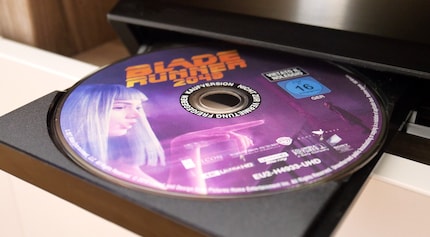
I don't want to pretend that this all cost me an unreasonable, physical effort. But it is a bit more complicated than selecting and playing my favourite film via the Smart TV app. But the thing about streaming is this: All content is heavily compressed.
Compressing means that a large file is made smaller than it actually is. Of course, this doesn't just happen. If I want to trim a file that is 150 GB in size to 50 GB, for example, then I have to take something away from it. This makes it lighter. What I take away is usually image or sound information. Image noise and artefacts occur. Things like "how many dimples can I see on Harrison Ford's face" or "how much bass does the revolver shot have". And this in turn has a negative effect on the original quality of the file.
And that's exactly what streaming services do - compress data. Why? Because of the limited transmission rate at which data flows from the server to your TV via the internet. For UHD content, this is around 20-30 megabits per second (Mbit/s), depending on the streaming provider and plan. This is not enough to transfer a 150 GB film from the server to your TV smoothly and within a reasonable time. So the film has to be compressed. The result: image and sound quality suffer from the compression.
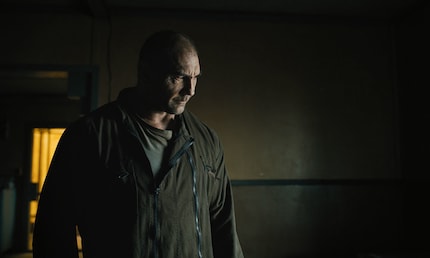
I look at my television. Agent 'K' is a blade runner. He hunts down renegade replicants - artificial humans - who have broken free from their slave existence in a bleak future in the year 2049. He's found Sapper Morton, a brute of a replicant. During the scene, I remind myself that UHD Blu-rays also use compressed data.
An Ultra HD Blu-ray has a storage capacity of around 100 GB. That's not enough for most films. Apart from the picture, there is usually also some bonus material and various audio tracks. However, the data is not nearly as heavily compressed as that of streaming platforms. Thanks to the transmission rate of HDMI cables with their 18,000 Mbit/s, the file only has to be compressed until it just fits on the disc.
So: Streamed UHD content always looks worse than if it were played from an Ultra HD Blu-ray disc. This also applies to the sound quality.
Agent 'K' and replicant Sapper engage in a brilliant fistfight. 'K' would have preferred to arrest the replicant, but Sapper gave him no choice. The tension makes me bite my fingernails. Then I think back to "The Matrix", one of the most influential films of my early youth. I didn't have a choice back then either.
I was too young for the cinema. Later, I had the support of my older brother at the shop counter. I still remember his head-shaking snort, accompanied by a "you're crazy" - the first DVD I bought in my life had cost me half a fortune. I didn't care.
Today I have my own household, pay taxes and electricity bills. Simply saying "I don't care" is no longer enough. But I still have the luxury of a physical disc. You'd almost think I was rich. Or at least close to it.
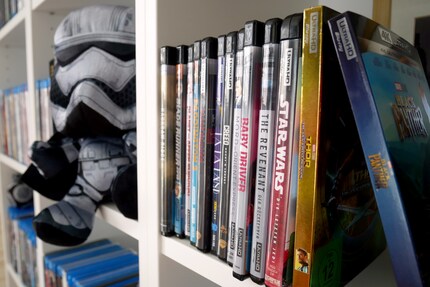
DVDs were once considered expensive, then came Blu-rays. New storage media always justify their price with significantly improved picture and sound quality. It's no different today.
"But UHD Blu-rays cost more than a monthly premium with Netflix," some people say indignantly.
True. Streaming services offer a huge range of products for a monthly fee that is significantly less than the price of a single UHD Blu-ray. The outrage is not entirely unjustified.
However: I own a UHD Blu-ray, physically. It's mine and I can take it anywhere without the internet. But I don't own streamed content. If I watch a series on Netflix or buy a feature film via Google Play or Apple TV, I am only buying the right to stream a film that is stored on a server somewhere in the world. If the company loses the licence rights - as happened with Netflix with a lot of Disney content that disappeared from the platform - I also lose the right to stream that content.
"Well, tough luck," says Netflix. With Google or Apple, at least I get my money back. None of this is really satisfying. As a collector, I want to own the things I buy.
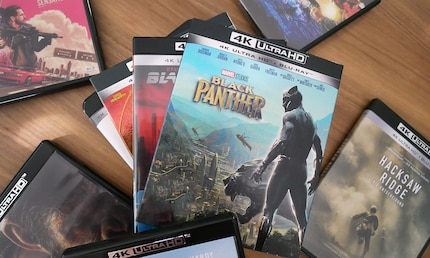
But I'm not interested in collecting alone. On a UHD Blu-ray, I not only get the film, but also bonus content such as making-ofs, cut scenes, gag reels and audio commentaries from the director, screenwriter or actors. For me, this is worth just as much as the film itself. And a small justification for the high price of a physical disc.
Meanwhile, Sapper thunders Agent 'K's head against the wall. In the background, a bubbling saucepan demands immediate attention with an insistent whistle. It's as if one of the two men has just got the time. I love this, and am already looking forward to the making-of.
Ultra HD Blu-rays promise four times the resolution of Full HD Blu-rays. That sounds fantastic in theory, but in practice it's not that important. The difference between Ultra HD and Full HD is actually barely noticeable. There are two simple reasons for this:
The ideal viewing distance can be calculated by multiplying the length of the screen diagonal by a factor of 1.5. For a 65-inch screen, this would be 165 cm × 1.5 = 247.5 cm. The further away you sit, the less the difference between UHD and FHD can be recognised. And even if the ideal seating distance is maintained: The larger resolution doesn't have as crazy big an impact on perceived picture quality as you might think.
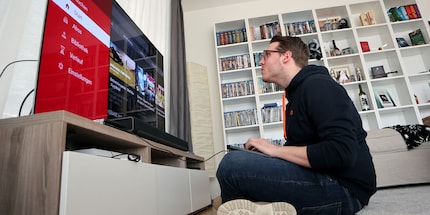
From a Marketing perspective, the calculation "higher resolution = better picture quality" is easier to market. Hence the constant focus on UHD, 4K, 8K and what-have-you. But what speaks most in favour of the picture quality of UHD Blu-rays is the extended contrast range. Namely: High Dynamic Range (HDR).
Simply put, an extended contrast range means that the difference between the darkest and brightest pixels is greater than with a conventional Blu-ray. This has a positive effect on the colours because more different light or dark shades can be displayed.
In figures, this means: depending on the HDR format, you get between 1.07 billion (HDR10) and 69 billion colours (Dolby Vision). In comparison, Blu-rays "only" provide around 16 million colours. An enormous difference. In more technical terms, this means that UHD Blu-rays cover around 75% of the colour space visible to us humans (Rec. 2020). Blu-rays, on the other hand, only cover 45% (Rec. 709), i.e. not even half.
UHD Blu-rays can therefore display more colours and details than Blu-rays thanks to their high contrast. Colours appear stronger and richer, but still natural. The latter is mainly because the image shown corresponds more closely to the reality that our eyes perceive. The four times higher resolution is a bonus that comes into play if you have a really big TV (65 inches or larger) in your living room.
I love my Ultra HD Blu-rays. I don't regret a single franc I've spent on them. Not just because of the high resolution, but because of High Dynamic Range. Because colour is more important than raw pixel mass.
In addition, UHD Blu-rays offer the best possible picture and sound quality available with today's technology compared to streams. The physical storage medium also gives me the certainty that the films belong to me - and not just the right to stream them. I can take them with me or lend them to someone at any time, without the need for the internet.
And you don't get all the bonus material in the stream anyway. But I like it just as much as the film itself.
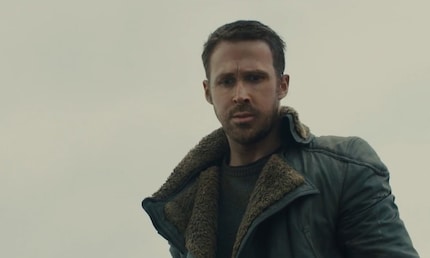
Agent 'K' finally has the upper hand. His gun is pointed at the replicant.
"How does it feel to kill your own kind?" asks Sapper. He does so because Agent 'K' is a replicant himself. An evolved replicant.
"I'm not killing my kind. It doesn't run away. Only the older models do that," he replies.
"You new models," snaps Sapper, "you're happy to scratch shit because you've never seen a real miracle."
The two shots from Agent 'K's revolver kill him instantly. The Blade Runner has no idea of the aforementioned "miracle", which harbours the potential to plunge the remaining social structures into total chaos. Nothing yet.
I follow the story with rapt attention.
I write about technology as if it were cinema, and about films as if they were real life. Between bits and blockbusters, I’m after stories that move people, not just generate clicks. And yes – sometimes I listen to film scores louder than I probably should.
Practical solutions for everyday problems with technology, household hacks and much more.
Show all